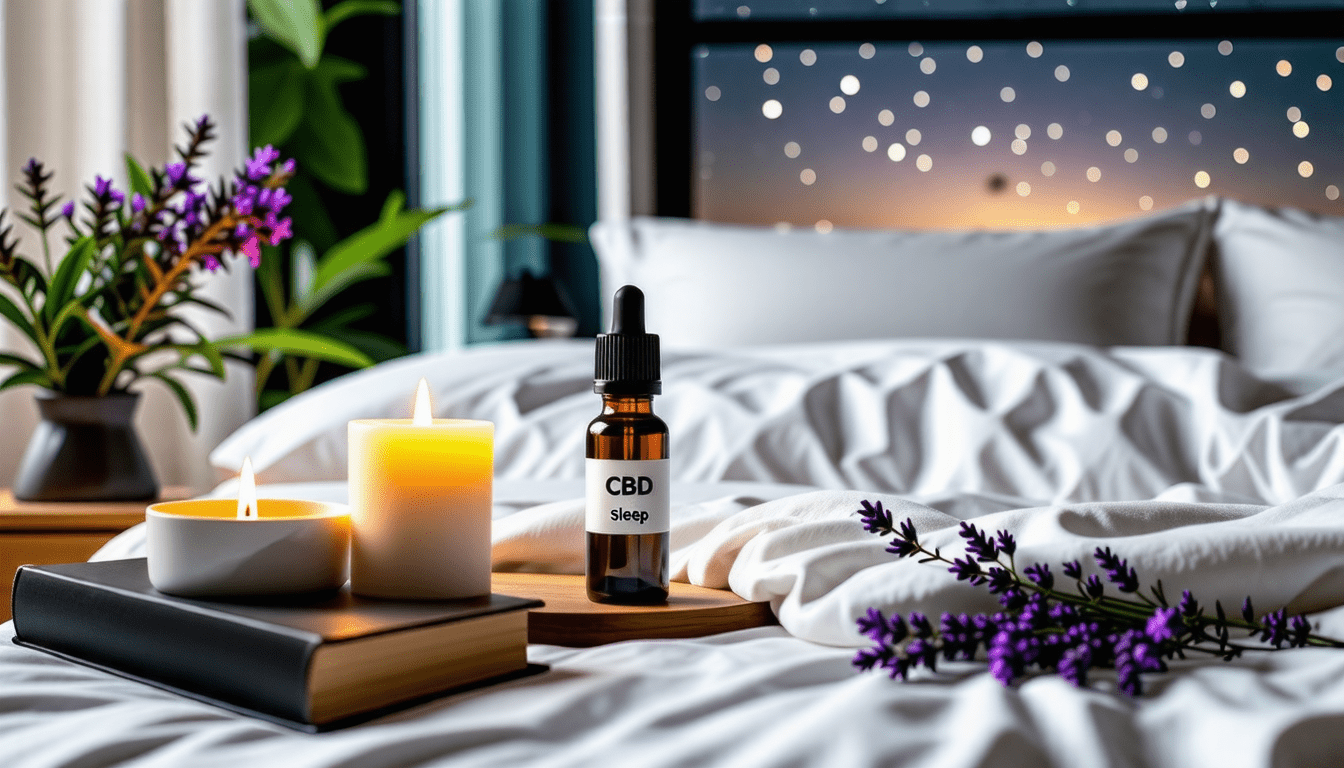Cbd for sleep: understanding its benefits and uses
|
IN BRIEF
|
As many seek effective solutions for their nighttime struggles, CBD emerges as a compelling option in the realm of natural remedies. This compound, derived from cannabis, is capturing attention for its potential to enhance sleep quality and address related concerns such as anxiety and chronic pain. With an increasing number of studies and personal testimonies highlighting its efficacy, understanding how CBD works, its benefits, and its various applications for improving sleep can help individuals make informed choices for their nightly routines.

In recent years, Cannabidiol (CBD) has garnered attention for its potential benefits in improving sleep quality. Many individuals are turning to CBD as a natural alternative to traditional sleep aids, seeking to find relief from insomnia and restless nights. This article delves into how CBD may aid sleep, the scientific evidence that supports its effectiveness, and the various ways it can be used to enhance sleep quality.
What is CBD?
CBD is one of over a hundred compounds found in the cannabis plant. Unlike its famous counterpart, THC, CBD is non-psychoactive, meaning it does not produce the “high” associated with marijuana. Instead, it has been linked to various therapeutic effects, particularly in the realm of health and wellness. As research continues to unfold, its potential as a natural remedy for sleep disturbances has come into focus.
How CBD Works for Sleep
The way CBD influences sleep is primarily linked to its interaction with the body’s endocannabinoid system (ECS), a complex network responsible for regulating various physiological processes. CBD may help to balance the body’s stress responses, potentially reducing anxiety levels which often disrupt sleep. By counteracting the overactivation of the stress hormone cycle, CBD helps create a more conducive environment for falling and staying asleep.
Benefits of CBD for Sleep
Research and anecdotal evidence suggest that CBD can offer numerous benefits for enhancing sleep quality. For instance, studies have shown that approximately 48% of participants using CBD expressed improvement in their ability to fall asleep faster. Additionally, 40% reported better sleep quality overall. CBD might also assist in alleviating environmental factors such as chronic pain and anxiety that can hinder sleep.
Scientific Evidence Supporting CBD for Sleep
While many people advocate for the effectiveness of CBD as a sleep aid, scientific opinions are still evolving. Some studies indicate that CBD may indeed improve sleep duration and quality, but results can vary among individuals. Further research is needed to establish standardized dosages and the long-term impacts of using CBD for sleep-related issues.
Using CBD for Sleep
There are several forms in which CBD can be consumed to promote better sleep. CBD oil, capsules, gummies, and tinctures are popular options. Each method comes with its own benefits, and the choice often depends on personal preference. For instance, individuals who prefer a fast-acting effect may opt for oils or tinctures, while those who prefer a more measured intake might choose capsules or gummies.
Potential Risks and Considerations
Though generally considered safe, using CBD is not without its potential risks. Side effects may include fatigue, diarrhea, and changes in appetite. As with any supplement, it’s important to consult with a healthcare provider before starting CBD, especially for those already on medication or with preexisting health conditions. Additionally, it’s essential to source CBD products from reputable suppliers to ensure quality and safety.
CBD presents an intriguing option for those seeking natural support for their sleep issues. With its potential ability to ease anxiety and promote relaxation, many users find relief and improvements in their sleep patterns. As you explore the benefits of CBD for sleep, consider discussing it with a healthcare professional to determine the most suitable approach for your individual needs.
| Aspect | Description |
| Mechanism | CBD interacts with the endocannabinoid system to promote relaxation. |
| Sleep Disorders | Might assist with insomnia, anxiety-related sleep disruptions, and chronic pain. |
| Research Findings | Evidence shows potential improvement in sleep duration and quality. |
| Dosage | Optimal dosage varies; starting low and adjusting is recommended. |
| Side Effects | Generally well-tolerated, but may cause fatigue or digestive issues. |
| Forms | Available as oil, gummies, capsules, and tinctures for flexibility. |
| Timing | Taking CBD 30-60 minutes before bed is often suggested for optimal results. |

In the quest for a good night’s sleep, many are turning to CBD (cannabidiol) as a potential solution. This article explores the various benefits and uses of CBD for sleep, how it works within the body, and what individuals should consider when looking to incorporate it into their nightly routine.
How CBD Works for Sleep
CBD interacts with the body’s endocannabinoid system, which plays a crucial role in regulating various functions, including sleep and mood. By potentially balancing the sleep-wake cycles, CBD may help in managing disrupted sleep patterns caused by stress or anxiety. It is believed that CBD can suppress the overproduction of stress hormones, contributing to a calmer state conducive to falling asleep.
Potential Benefits of CBD for Sleep
Research and anecdotal evidence suggest that CBD may offer several benefits for sleep:
- Improved Sleep Duration: Studies indicate that nearly 50% of individuals using CBD reported falling asleep faster and enjoying longer sleep durations.
- Decreased Anxiety: By addressing anxiety and chronic pain, CBD may create a more comfortable state for users, allowing for better sleep.
- Reduced Insomnia Symptoms: For those struggling with insomnia, CBD may help in both falling asleep and staying asleep, providing a dual solution to a common issue.
Is CBD a Safe Sleep Aid?
While many individuals report positive effects, the scientific community is still exploring the safety and efficacy of CBD as a sleep aid. Not all users experience the same effects, and caution is advised. Consulting with a healthcare professional can help determine whether CBD is a suitable option for individual needs. For more detailed insights, you can look into the article on CBD wellness.
How to Use CBD for Sleep
When considering CBD for sleep, it is essential to understand the different forms available. Options include CBD oil, capsules, or gummies. Each form has its absorption rate and efficiency:
- CBD Oil: Often taken sublingually, providing quicker effects.
- Capsules: Though convenient, may take longer to take effect.
- CBD Gummies: These offer a tasty alternative, but remember to consider the sugar content.
Finding the right dose is crucial. Individuals are encouraged to start with a lower dose and gradually increase until they find the optimal amount for their needs. More information on how to find the right dosage can be found in the article on CBD oil benefits.
Side Effects and Considerations
While CBD is generally well-tolerated, some potential side effects might include drowsiness, gastrointestinal discomfort, or changes in appetite. Always discuss with a healthcare provider before starting any new supplement, particularly for those who are pregnant, nursing, or taking medication.
Types of CBD: Broad, Full-Spectrum, and Isolate
The choice of CBD type can impact its effectiveness for sleep: Broad-spectrum CBD, full-spectrum CBD, and CBD isolate each have distinct properties. Broad-spectrum contains multiple cannabinoids without THC, while full-spectrum includes all cannabinoids present in the plant, including trace amounts of THC. On the other hand, CBD isolate is pure CBD without other cannabinoids.
Understanding these differences can help users select the most suitable form of CBD for their individual needs. Additional insights on these types can be found in articles about broad-spectrum CBD, full-spectrum CBD, and CBD isolate.
- Benefit: Helps reduce anxiety
- Use: May improve sleep duration
- Benefit: Alleviates chronic pain
- Use: Supports a balanced sleep cycle
- Benefit: Promotes relaxation
- Use: Can be taken as oil, gummies, or tincture
- Benefit: May help manage insomnia
- Use: Dosage varies between individuals
In recent years, Cannabidiol (CBD) has emerged as a popular natural remedy for various health issues, including sleep disorders. Many people are turning to this compound to help them relax and improve their sleep quality. This article will explore the potential benefits of CBD for sleep, how it works within the body, and the recommendations for using it effectively.
How Does CBD Work for Sleep?
CBD interacts with the body’s endocannabinoid system, which plays a crucial role in maintaining homeostasis. This system regulates a variety of physiological processes, including mood, pain sensation, and sleep. By influencing the receptors of this system, CBD may help manage stress and anxiety, which are two significant barriers to a good night’s sleep.
Research suggests that CBD can reduce the overproduction of stress hormones, thus calming the mind and preparing the body for rest. It may also help regulate sleep cycles by balancing hormones such as melatonin, leading to a more consistent sleep-wake rhythm.
Benefits of Using CBD for Sleep
The use of CBD for sleep comes with a range of potential benefits:
1. Reducing Anxiety and Stress
A significant number of studies and anecdotal evidence point to CBD’s effectiveness in reducing anxiety and stress levels. By lowering these feelings, individuals may find it easier to unwind at bedtime, leading to a more peaceful sleep.
2. Alleviating Pain
Those who struggle with chronic pain often report that it negatively impacts their sleep. CBD has been shown to provide relief from various pain conditions, making it easier for sufferers to fall asleep without being distracted by discomfort.
3. Improving Sleep Quality and Duration
Some individuals taking CBD for sleep have reported beneficial effects on the quality and duration of their sleep. In one study, nearly half of the participants found that CBD helped them fall asleep faster, and a substantial percentage reported longer, uninterrupted sleep.
4. Addressing Insomnia Symptoms
If you are battling insomnia, turning to CBD might be a worth-it option. Some studies suggest that CBD can help not only in falling asleep but also in staying asleep throughout the night, thereby addressing various insomnia symptoms.
How to Use CBD for Sleep
When considering CBD for sleep, it is essential to understand how to use it effectively:
1. Choosing the Right Type of CBD
There are multiple forms of CBD available, including oils, capsules, gummies, and edibles. Each method has its own absorption rate and effects duration. Full-spectrum, broad-spectrum, and CBD isolate are terms used to indicate the types of cannabinoids included. For sleep, full-spectrum CBD might offer synergy benefits, while CBD isolate is a pure form that guarantees no THC.
2. Determining Your Dosage
Dosing can vary widely among individuals, so finding the right amount for you is vital. Starting with a low dose and gradually increasing it based on your body’s response can help find the optimal amount. Consulting with a healthcare professional for personalized dosage recommendations is always a smart approach.
3. Timing Your Dose
The timing of CBD intake can also influence its effectiveness for sleep. Many experts recommend taking CBD approximately 30 to 60 minutes before bedtime to allow it to take effect as you prepare for sleep.
Potential Considerations and Side Effects
While CBD is generally regarded as safe, it is important to be aware of potential side effects, which may include dizziness, changes in appetite, or fatigue. Consulting with a healthcare professional before starting any new supplement regime is advisable, especially if you have existing health conditions or are taking medications.
In summary, CBD presents a promising avenue for individuals struggling with sleep issues. Understanding its benefits and how to use it appropriately can empower you to take more control over your sleep health.


Post Comment